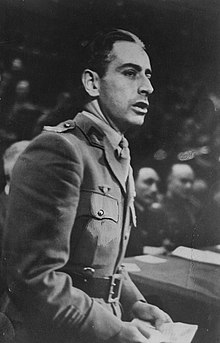Pierre Brossolette
| Pierre Brossolette | |
|---|---|

Pierre Brossolette (1943)
|
|
| Born |
25 June 1903 Paris XVI, France |
| Died | 22 March 1944 (aged 40) Paris V, France |
| Resting place | Père Lachaise Cemetery's Columbarium |
| Other names | Pedro, Brumaire, Bourgat, Bernier, Baron, Boutet, Briant |
| Education | Agrégé in History |
| Alma mater | École Normale Supérieure |
| Occupation | Journalist and politician |
| Title | (Major) |
| Spouse(s) | |
| Children | Anne Brossolette-Branco, |
| Awards | |
| Website | www |
Pierre Brossolette (25 June 1903 – 22 March 1944) was a French journalist, a leading left-wing politician, and a major hero of the French Resistance.
Pierre Brossolette was born in Paris, France to a family deeply involved in the fights for laic schools in early 20th century France. His father was Léon Brossolette, General Inspector for Primary Education, and was the nephew of Francisque Vial, Director of Secondary Education, responsible for making secondary education free in France.
Pierre ranked first at the entrance examination to the prestigious École Normale Supérieure, and throughout his education held the title of "cacique" which was internally attributed to the most brilliant student, ahead of intellectuals such as philosopher Vladimir Jankélévitch and two years before Jean-Paul Sartre and Raymond Aron. In 1925 he graduated second to Georges Bidault after a small scandal on the dissertation themes for the final examination. His passion for history had led him to choose this "agrégation" instead of the more usual and prestigious philosophy one. During this time he married Gilberte Bruel and had two children, Anne and Claude.
Instead of pursuing an academic career like most normaliens, he longed for action and decided to enter journalism and politics. He joined the Section française de l'Internationale ouvrière (SFIO), the main socialist party, in 1929, adhered to the LDH and LICA league and entered freemasonry. He worked as a journalist for Notre Temps, L'Europe Nouvelle, the party newspaper Le Populaire and the state-owned but was fired when he violently opposed the Munich Agreement on air in 1939. In his newspaper columns, Brossolette had evolved from a resolute pacifist and europeanist, after Aristide Briand's ideals, to a denunciator of both fascism and communism.
...
Wikipedia
